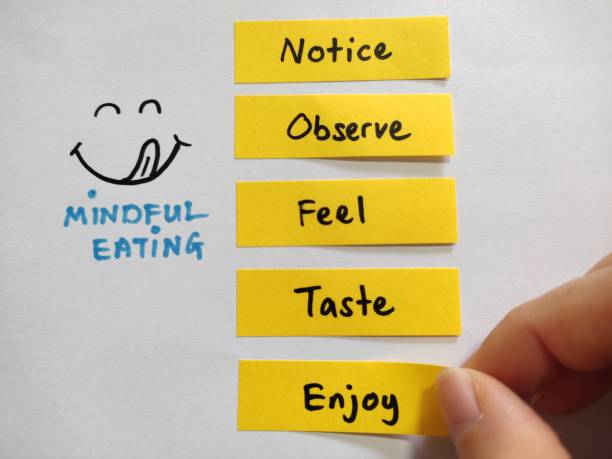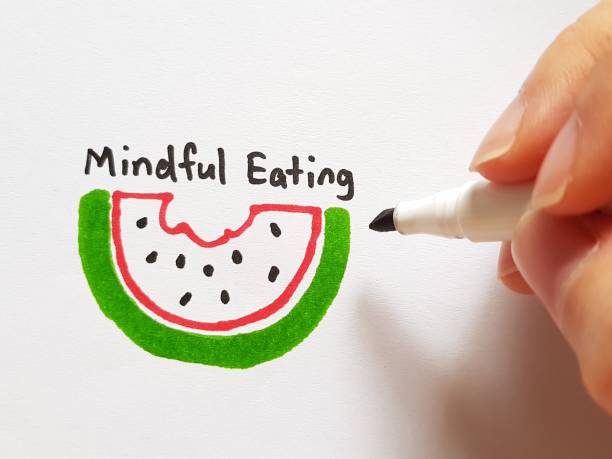Mindful eating activity is a practice where you pay full attention to the experience of eating. Mindful eating is all about slowing down and fully enjoying your meals instead of rushing or eating without paying attention.
It invites you to notice the colors, smells, textures, and tastes of your food, and how it makes you feel in your body. It’s not about strict rules or dieting, but about forming a better connection with what you’re eating.
Mindful eating also helps reduce stress and build a healthier relationship with food.

How does mindful eating activity contribute to healthy eating?
Being mindful of the foods you eat inspires you to pay attention to their smell, texture, taste, and feel. It helps you connect with your eating experience and become more aware of the food you consume.
Cherpak reported in 2019 that slowing down food intake aids digestion and reduces various digestive disorders like IBS (Irritable Bowel Syndrome). Learning about where food comes from and how it is prepared helps build a relationship with food.

Mindful eating activity
- Considers the broader context of the meal: where the food came from, how it was prepared, and who prepare it.
- Notices internal and external guidelines that affect how much we eat.
- Observes how the food looks, tastes, smells, and feels in our bodies as we eat, and how our body feels after eating the meal.
- Expresses gratitude for the meal.
- May involve deep breathing or meditation before or after the meal.
- Reflects on how our food choices impact our local and global environment.
Thoughtful eating techniques can help improve symptoms of depression, eating disorders, worry, obesity, and stress.
Mindful eating promotes healthy eating habits, prevents overeating, and improves mental health. It can also break habits such as watching TV or scrolling through social media while eating, which distracts from the enjoyment and awareness of food.
Mindful eating benefits
Thoughtful eating has many benefits, including:
- Improving digestion: Mindful eating activity can help digestion by reducing stress, a common cause of digestive issues.
- Weight loss: Mindful eating prevents mindless eating and overeating, supporting weight loss efforts.
- Reducing stress: Mindful eating practices like meditation and slowing down can help lower cortisol levels associated with stress.
The common distractions during eating are using a cell phone, checking email, or texting on our laptop or mobile phone. Please don’t do this while you’re eating; it is a very bad habit for your health.
You should set aside some time to eat. Practice mindful eating: think about how the food grew and the taste of the food, and chew your food properly. Also, do not turn on your TV while eating.
Mindful eating exercise
- Choose a quiet place to eat (no TV, phones, or multitasking).
- Set your food on a clean, attractive plate to make it visually appealing.
- Before starting, pause to acknowledge the food in front of you.
- Reflect on the journey it took to arrive at your plate, from nature to preparation.
- Observe the colours, shapes, and textures of your food.
- Close your eyes and take a deep inhale to notice the aroma.
- Feel the texture of the food if appropriate (e.g., holding a piece of fruit).
- Notice any sounds, like the crunch of a vegetable.
- Use smaller portions for each bite.
- Chew slowly and aim for 20–30 chews per bite to experience the flavors and texture fully.
- Plz pay attention to how the food feels in your mouth and the taste as it changes while you chew.
- Pause after each bite and ask yourself:
- Am I still hungry?
- How does this food make me feel?
- Notice any signals of fullness or satisfaction without rushing.
- If your mind shifts, mindfully bring your focus back to the meal.
- Avoid labelling foods as “good” or “bad”; observe how they make you feel.
- When you finish eating, take a moment to thank yourself for practicing mindful eating.
- Reflect on how the experience was different from usual.
Some More Mindful eating exercise
- Chew thoroughly
- Eat slowly
- Eliminate distractions
- Experience the food with all five senses
- Listen to your body
Practice these things with your children as well. Parents have bad habits of giving phones to children while eating. Don’t do this. If you do, the food will not be beneficial for children.
In conclusion, mindful eating is a beneficial practice that can improve your digestion, reduce stress, and help you build a better relationship with food.
If you found this post helpful, leave a comment sharing your thoughts or experiences with mindful eating. Don’t forget to subscribe to our newsletter for more gut health-related tips and healthy recipes.

Quotes about mindful eating activity
When you eat mindfully, food becomes a source of nourishment and pleasure, not stress or guilt.”- Jan Chozen Bays.
“The act of eating is an opportunity to turn a meal into a meditation.“ – Thich Nhat Hanh.
“Mindful eating helps us rediscover a healthy and joyful relationship with food.” – Thich Nhat Hanh.
“Awareness is the first step in taking care of yourself and making conscious food choices.” – Geneen Roth.
“Eating is not merely a material pleasure. Eating well gives a spectacular joy to life and contributes immensely to goodwill and happy companionship.” – Elsa Schiaparelli.
“The way we eat is as important as what we eat.“ – Michael Pollan.
“The more mindful you are about your eating, the less you’ll need to eat to feel satisfied.“ – Geneen Roth.



